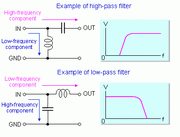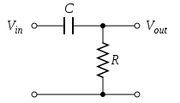
Passive Filters
About[]
A passive filter is a kind of electronic filter that is made only from passive elements -- in contrast to an active filter, it does not require an external power source (beyond the signal). Since most filters are linear, in most cases, passive filters are composed of just the four basic linear elements -- resistors, capacitors, inductors, and transformers. More complex passive filters may involve nonlinear elements, or more complex linear elements, such as transmission lines. Television signal splitter consisting of a passive hi-pass filter (left) and a passive low-pass filter (right). The antenna is connected to the screw terminals to the left of center.
A passive filter has several advantages over an active filter:
- Guaranteed stability
- Passive filters scale better to large signals (tens of amperes, hundreds of volts), where active devices are often impractical
- No power consumption, but the desired signal is invariably attenuated. If no resistors are used, the amount of signal loss is directly related to the quality (and the price) of the components used.
- Inexpensive (unless large coils are required)
- For linear filters, generally, more linear than filters including active (and therefore non-linear) elements
They are commonly used in speaker crossover design (due to the moderately large voltages and currents, and the lack of easy access to power), filters in power distribution networks (due to the large voltages and currents), power supply bypassing (due to low cost, and in some cases, power requirements), as well as a variety of discrete and home brew circuits (for low-cost and simplicity). Passive filters are uncommon in monolithic integrated circuit design, where active devices are inexpensive compared to resistors and capacitors, and inductors are prohibitively expensive. Passive filters are still found, however, in hybrid integrated circuits. Indeed, it may be the desire to incorporate a passive filter that leads the designer to use the hybrid format.
High Pass[]

High Pass Filter
A high-pass filter is an LTI filter that passes high frequencies well but attenuates (i.e., reduces the amplitude of) frequencies lower than the cutoff frequency. The actual amount of attenuation for each frequency is a design parameter of the filter. It is sometimes called a low-cut filter; the terms bass-cut filter or rumble filter are also used in audio applications.[citation needed] A high-pass filter is the opposite of a low-pass filter, and a band-pass filter is a cascade combination of a high-pass filter and a low-pass filter.
Applications[]
Such a filter could be used as part of an audio crossover to direct high frequencies to a tweeter while blocking bass signals which could interfere with, or damage, the speaker. When such a filter is built into a loudspeaker cabinet it is normally a passive filter that also includes a low-pass filter for the woofer and so often employs both a capacitor and inductor (although very simple high-pass filters for tweeters can consist of a series capacitor and nothing else). An alternative, which provides good quality sound without inductors (which are prone to parasitic coupling, are expensive, and may have significant internal resistance) is to employ bi-amplification with active RC filters with separate power amplifiers for each loudspeaker making an active crossover.[citation needed]
Rumble filters are high-pass filters applied to the removal of unwanted sounds below or near to the lower end of the audible range. For example, noises (e.g., footsteps, or motor noises from record players and tape decks) may be removed because they are undesired or may overload the RIAA equalization circuit of the preamp.[citation needed]
High-pass and low-pass filters are also used in digital image processing to perform transformations in the spatial frequency domain. High-pass filters are also used for AC coupling at the input and output of amplifiers
Reference[]
Links[]
View more passive filter types.
Video[]

ELECTRICITY - FILTERS - B